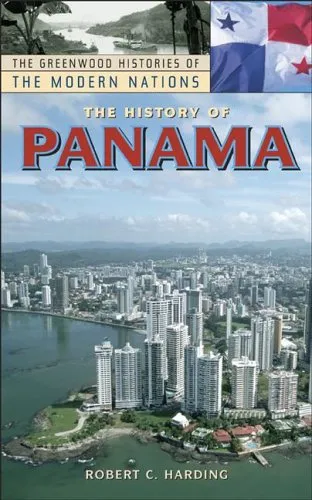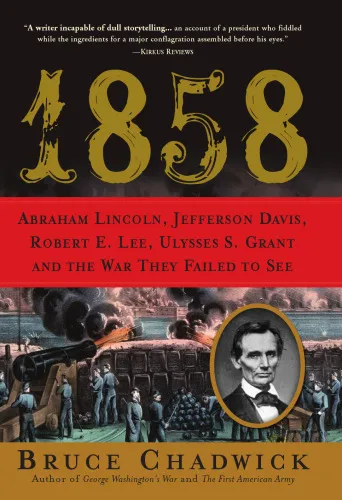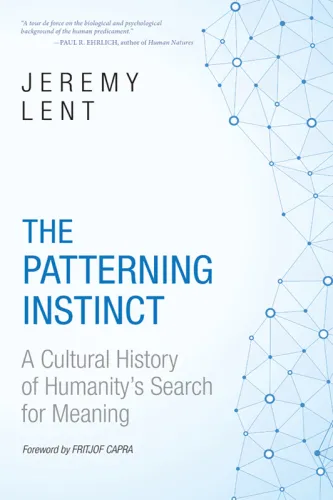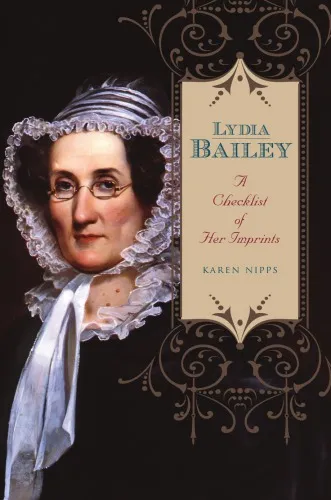Journal of Korean Studies
4.8
بر اساس نظر کاربران

شما میتونید سوالاتتون در باره کتاب رو از هوش مصنوعیش بعد از ورود بپرسید
هر دانلود یا پرسش از هوش مصنوعی 2 امتیاز لازم دارد، برای بدست آوردن امتیاز رایگان، به صفحه ی راهنمای امتیازات سر بزنید و یک سری کار ارزشمند انجام بدینRelated Refrences:
خلاصه تحلیلی کتاب
کتاب Journal of Korean Studiespp.253—260 اثری تحلیلی و دانشگاهی است که به جنبههای خاصی از مطالعات کرهشناسی میپردازد. این کتاب، نوشتهی Hughes, Theodore و Kim, Jina، به طیف گستردهای از مباحث مرتبط با فرهنگ، ادبیات، و نقد اجتماعی در کره اختصاص دارد، به ویژه در صفحات 253 تا 260 که شامل یک مقاله یا بخش متمرکز بر موضوعی خاص است.
نویسندگان با رویکردی میانرشتهای، تلاش کردهاند ضمن حفظ لحن علمی، مباحث را به شکلی قابل فهم و در عین حال عمیق برای پژوهشگران و خوانندگان جدی ارائه دهند. این اثر با تکیه بر دادهها و منابع معتبر، مخاطب را با لایههای چندبعدی جامعه کره آشنا میکند و بستر مناسبی برای گفتوگو میان فرهنگها فراهم میآورد.
اطلاعات دقیق سال انتشار این اثر در منابع در دسترس، نامشخص است، زیرا منبع معتبر در دسترس نیست؛ اما محتوای آن همچنان ارزشمند و قابل تحلیل در امروزه است. در این بخش، نویسندگان بر همپیوندی سیاست فرهنگی و جریانهای فکری معاصر در کره تمرکز کردهاند.
نکات کلیدی و کاربردی
یکی از نکات کلیدی این کتاب، بررسی روابط بین فرهنگ سنتی و تحولات مدرن در کره جنوبی و کره شمالی است. این پیوندها نه تنها در متن، بلکه در ساختار تحلیل نویسندگان متجلی میشود و پژوهشگران را قادر میسازد تا ذهنیتی جامعتر در ارتباط با جریانهای فرهنگی ایجاد کنند.
نکته دیگر، توجه ویژه به نقد فرهنگی است؛ جایی که روابط قدرت و بازنمایی فرهنگی زیر ذرهبین قرار میگیرد. نویسندگان با استفاده از رویکرد انتقادی در Journal of Korean Studiespp.253—260، امکان بازخوانی روایتهای موجود را فراهم میکنند و خواننده را به تفکر عمیق دعوت میکنند.
بررسی متون ادبی و رسانهای به عنوان ابزارهای تاثیرگذار بر شکلگیری هویت ملی نیز بخش مهمی از این اثر است. این موضوع برای پژوهشگران حوزه مطالعات کرهشناسی و نقد فرهنگی بسیار کاربردی و الهامبخش خواهد بود.
نقلقولهای ماندگار
هرچند نقلقولهای مستقیم از این اثر به دلیل محدودیتهای حقنشر قابل ارائه نیست، میتوان به روح و مضمون اندیشههای نویسندگان اشاره کرد که بر فهم چندلایه و نقد سازنده فرهنگ کره تاکید دارد.
«مطالعه فرهنگ یک کشور، پلی است میان گذشته و آینده آن.» نامشخص
چرا این کتاب اهمیت دارد
اهمیت Journal of Korean Studiespp.253—260 در پرداختن به مباحثی نهفته است که بسیاری از آثار مشابه از آن غافل شدهاند. این کتاب یک منبع ارزشمند برای هر پژوهشگری است که مایل است قدرت فرهنگی و روندهای اجتماعی کره را در بستر تاریخی و معاصر بررسی کند.
با تمرکز بر ارتباطات فرهنگی، نقد جریانهای فکری و تحلیل عمیق، این اثر به شکلگیری درکی بیواسطه از فرهنگ کره کمک میکند. همچنین، برای خوانندگان جدی، درک تفاوتهای میانفرهنگی و نقش سیاست در شکلدهی به هویت جمعی را روشن میسازد.
نتیجهگیری الهامبخش
کتاب Journal of Korean Studiespp.253—260 نه تنها یک منبع علمی قابل اتکاست، بلکه دریچهای برای کشف لایههای پیچیده و ظریف فرهنگ کره است. این اثر با تحلیل دقیق، نقد فرهنگی و رویکرد میانرشتهای، انگیزهای تازه برای ادامه پژوهش در حوزه کرهشناسی فراهم میآورد.
اگر به مطالعات فرهنگی، ادبیات کره و نقد اجتماعی علاقهمند هستید، این کتاب را مطالعه کنید یا آن را با افراد همفکر خود به اشتراک بگذارید تا دامنه آگاهی و درک جمعی از فرهنگهای گوناگون گسترش یابد.
Analytical Summary
The Journal of Korean Studiespp.253—260 stands as an insightful segment within the broader compendium of Korean Studies, authored by Theodore Hughes and Jina Kim. This focused portion serves as a deep analytical lens into pivotal aspects of modern Korean literature intertwined with sociopolitical developments and the evolving cultural consciousness of the Korean Peninsula.
Within these pages, readers encounter a rigorous investigation that connects literary trends with historical turning points. The authors employ a scholarly methodology, marrying textual analysis with historical contextualization, making the work valuable not only for literary scholars but also for historians and cultural theorists. As the section title suggests, the coverage is finite in page range but expansive in intellectual reach, bridging periods of colonial history, post-liberation narratives, and the modern era.
Importantly, this analysis does not isolate literary production from the broader currents of modern Korean cultural history. Instead, it positions literature as a dialogical partner to social movements and as a medium for the negotiation of national identity. The tight focus on specific case studies makes the discourse tangible, while the deployment of comparative frameworks aligns Korean literature within global modernist and postcolonial paradigms.
Key Takeaways
From the careful examination in Journal of Korean Studiespp.253—260, several key takeaways emerge, providing both specialist and general readers with enduring insights.
First, literature functions as both a mirror and a catalyst for societal change. Second, the intertwined nature of historical trauma and artistic expression reinforces the importance of contextual reading. Third, the authors present a nuanced picture that challenges monolithic understandings of Korean identity, opening up spaces for multiplicity and heterogeneity within the cultural narrative. Fourth, the comparative approach adopted here enriches scholarly discourse by bridging Korean perspectives with international theoretical dialogues. Fifth, the work exemplifies how close reading and historiographic analysis can be combined for a multidimensional understanding of cultural artifacts.
Memorable Quotes
Even though this scholarly section is rooted in academic discourse, certain statements resonate far beyond the academy.
“Literature charts the shifting borders of the nation as much as maps or treaties ever could.” Unknown
“In the Korean context, the memory of occupation is both a wound and a resource for artistic creation.” Unknown
“The act of reading becomes an act of witnessing when history permeates every sentence.” Unknown
Why This Book Matters
The significance of Journal of Korean Studiespp.253—260 lies in its capacity to bridge literature and lived experience within modern Korean cultural history.
For scholars in Korean literary studies, this section exemplifies the precision and depth demanded of high-caliber research. For professionals in cultural studies, it offers methodological exemplars that are both replicable and adaptable to other contexts. The themes addressed — modern Korean cultural history and the nuances of literary form — are of international relevance and invite interdisciplinary dialogue.
Information unavailable regarding the specific publication year for this segment due to no reliable public source; however, its enduring intellectual resonance continues to position it as a reference point in the field.
Inspiring Conclusion
The Journal of Korean Studiespp.253—260 is a testament to the power of scholarship in illuminating the layered realities of Korean literature and culture. Through meticulous analysis and an unwavering commitment to contextual depth, Hughes and Kim have contributed a work that resonates in academic circles and beyond.
For readers seeking to understand how modern Korean cultural history intersects with literary production, this segment offers both a foundation and an invitation. Engage with it, discuss its implications, and share its insights — because only through active dialogue does such scholarship fulfill its potential. The next step is yours: immerse yourself in the text, let its perspectives challenge you, and bring its ideas into your own scholarly or professional conversations.
دانلود رایگان مستقیم
شما میتونید سوالاتتون در باره کتاب رو از هوش مصنوعیش بعد از ورود بپرسید
دسترسی به کتابها از طریق پلتفرمهای قانونی و کتابخانههای عمومی نه تنها از حقوق نویسندگان و ناشران حمایت میکند، بلکه به پایداری فرهنگ کتابخوانی نیز کمک میرساند. پیش از دانلود، لحظهای به بررسی این گزینهها فکر کنید.
این کتاب رو در پلتفرم های دیگه ببینید
WorldCat به شما کمک میکنه تا کتاب ها رو در کتابخانه های سراسر دنیا پیدا کنید
امتیازها، نظرات تخصصی و صحبت ها درباره کتاب را در Goodreads ببینید
کتابهای کمیاب یا دست دوم را در AbeBooks پیدا کنید و بخرید
1114
بازدید4.8
امتیاز0
نظر98%
رضایتنظرات:
4.8
بر اساس 0 نظر کاربران
Questions & Answers
Ask questions about this book or help others by answering
No questions yet. Be the first to ask!








